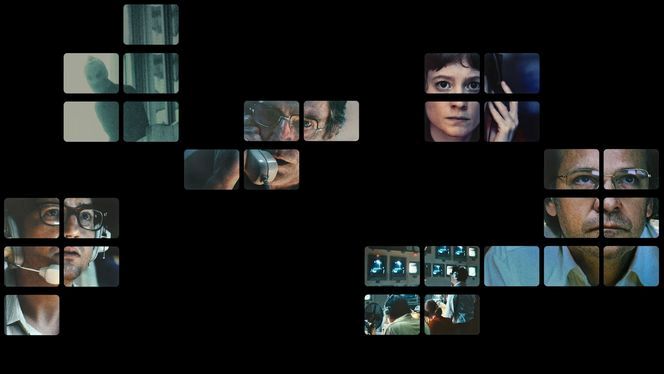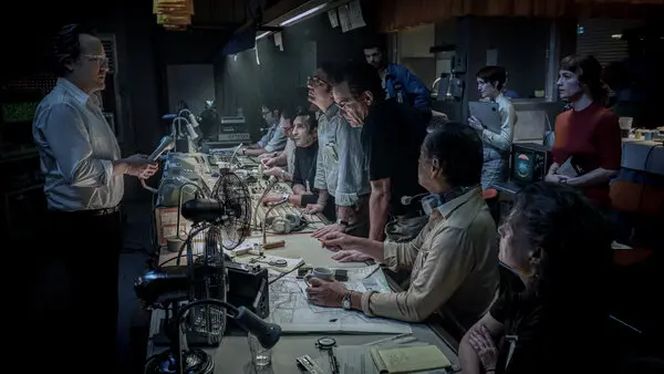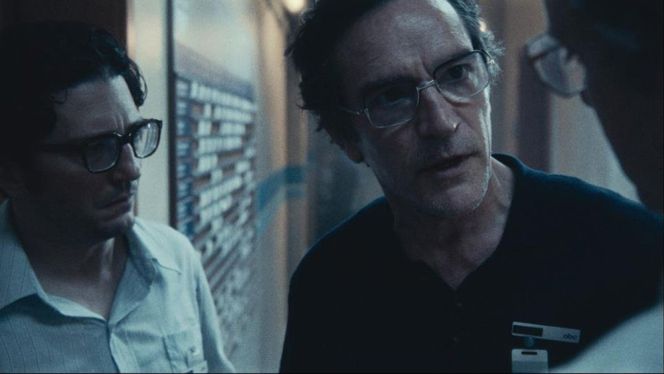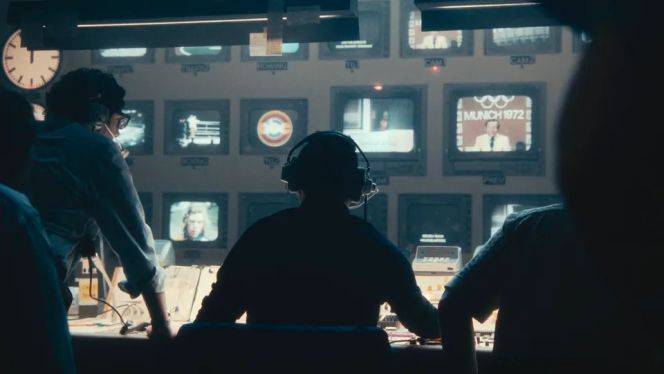MOVIE REVIEW – Swiss director Tim Fehlbaum’s September 5 tackles a story that could have easily demanded a grand, large-scale approach, yet it confines itself almost entirely to a few dimly lit rooms. The film revisits one of history’s most harrowing terrorist attacks—the 1972 Munich massacre, in which Israeli athletes were taken hostage—but it does so from an unexpected angle. Instead of focusing on the terrorists, the victims, or the authorities, it follows a team of overwhelmed TV journalists struggling to broadcast the unfolding tragedy in real-time to a stunned global audience.
September 5 is far from the first film to chronicle the infamous Munich massacre—One Day in September, a documentary, won an Oscar in 1999, and Steven Spielberg’s Munich explored Israel’s subsequent retaliation six years later. However, Fehlbaum offers a completely fresh perspective: rather than placing the camera inside the hostage rooms or at the scene of the failed rescue mission, he fixes it on the control room monitors that relayed the crisis to the world. In doing so, he defies conventional storytelling yet successfully unearths the complex moral dilemmas embedded in the event.
Reporting From Hell
The film can be seen as a companion piece to Munich and One Day in September, but it also shares DNA with journalism-centric dramas like Spotlight, She Said, and Collective. However, unlike those films, which ultimately celebrate journalistic triumphs, September 5 offers no such catharsis.
At its core, the film follows the reporters, producers, and technicians from ABC Sports who arrived in Munich expecting to cover an athletic competition. For the first week of the Olympics, that was exactly what they did. The film takes its time establishing this routine, offering a glimpse into ABC’s operations near the Olympic Village: ABC Sports President Roone Arledge oversees the control room, constantly making instinctively sharp calls, while young producer Geoff Mason (John Magaro) gets his first taste of live TV pressure. Meanwhile, translator Marianne Gebhardt (Leonie Benesch, the standout from last year’s Oscar-nominated The Teacher’s Lounge) proves invaluable to the team.
The setting is claustrophobic—a dark control room surrounded by a maze of tiny offices—and the film adopts a meticulous, procedural approach. The crew reviews footage, performs tech checks, and prepares for the morning broadcast, blissfully unaware that history is about to be rewritten just outside. Then, distant gunfire echoes from the Olympic Village. Someone in the hallway mutters, “Was that a gunshot?”
It’ll Be Over in an Hour, Right?
The gunfire isn’t a false alarm. Just a short distance away, eight members of the Palestinian group Black September have scaled the fence, taken Israeli athletes hostage, and executed two of them. Arledge quickly grabs the phone, demanding early access to the satellite for a live broadcast, assuming it’s just a brief incident. “The Germans will have this wrapped up in an hour,” he reassures himself.
Of course, the Germans don’t resolve the crisis in an hour. The negotiations and police maneuvers remain a mystery to the audience, as the camera never leaves the ABC newsroom. Despite the unfolding terror just 100 yards away, the action we witness remains routine: film reels are developed, wires are hastily patched together, and phones are dismantled and rigged to allow reporter Peter Jennings’ radio dispatches from the Olympic Village to go live. The confined newsroom becomes increasingly suffocating, with the outside world existing only through flickering control room monitors.
Where Does a Journalist’s Responsibility End?
As the crisis drags on, the pressure on ABC’s team intensifies. At the time, audiences weren’t accustomed to experiencing terrorist attacks in real-time—such news typically arrived in the next day’s papers, not live on their television screens. Heated debates arise over whether words like “terrorist” or “guerrilla” should be used. What happens if the live cameras capture someone being executed? Should they share footage with CBS to prevent the rival network from seizing control of the satellite feed? (The solution: a technician figures out how to permanently stamp “ABC” onto the footage before handing it over.)
“Our job is simple,” Arledge states at one point. “We put the camera in the right place and follow what happens.”
Moral Dilemmas in the Dark
The ethical questions extend beyond the newsroom and into the theater. In films like this, the audience instinctively roots for the journalists, willing them to succeed in their coverage. But here’s the unsettling reality: everyone watching September 5 knows how this story ends. The so-called “success” of these journalists means bringing the world the grim news of a mass killing. How can you cheer for that?
For the ABC team, this is the defining challenge of their careers, but the real stakes are a few blocks away, where athletes are bound, brutalized, and ultimately murdered. September 5 doesn’t let the audience escape that discomfort—on the contrary, it leans into it, using it as its greatest strength. Unlike most films about journalism, it refuses to offer easy answers or even the illusion of victory.
The film’s quiet yet devastating ending delivers an emotional gut punch, even for those already familiar with the events. At first, it may seem counterintuitive to recount such a tragedy through the perspective of journalists stuck in a dark control room, unable to intervene. But by the time the credits roll, September 5 has made its case: sometimes, the most effective way to tell a story is by showing those forced to watch it unfold.
–Gergely Herpai „BadSector”-
September 5
Direction - 7.6
Actors - 7.1
Story - 7.8
Visuals/Music/Sounds - 7.2
Ambience - 7.5
7.4
GOOD
September 5 forgoes the usual pulse-pounding hostage thriller format in favor of a more introspective, morally complex approach, focusing on the journalists caught in the ethical crossfire. What at first seems like a minimalist constraint soon reveals itself to be the film’s greatest strength. The result is a tense, thought-provoking piece of cinema that earns its place among the best films about journalism and historical tragedy.















![[TGA 2025] Star Wars: Galactic Racer Focuses on High-Stakes Podrace Runs [VIDEO]](https://thegeek.games/wp-content/uploads/2025/12/theGeek-Star-Wars-Galactic-Racer-300x365.jpg)



Leave a Reply